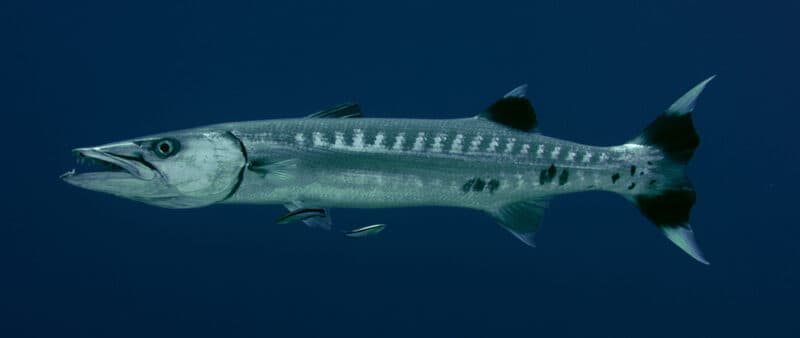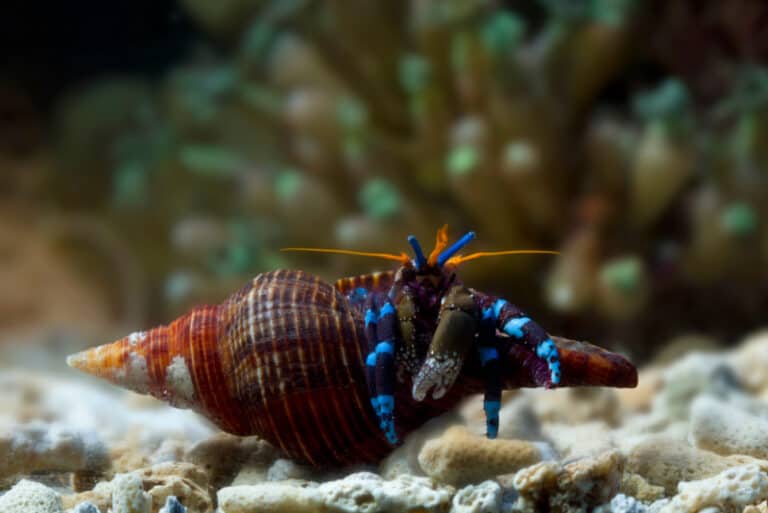Can You Eat Barracuda Meat?

The same question has been asked around the world by saltwater anglers–“Can you eat Barracuda meat?” Our answer is the same about almost any sport fish–“That depends.”
Why Doubt the Safety of Eating Barracuda?
The fish are popular with sports anglers because of their large size, acrobatic fighting ability, and their white flaky meat, that is low in fat and high in Omega 3 oils.
Why would anyone question eating barracuda when many people claim this fish is delicious?
Mostly, tropical seas are ideal for the growth of some algae that, under the right circumstances, release a toxic substance. There is a chance that small fish will consume this poisonous alga.
Barracudas, which are predators, can be poisoned by eating these fish and then developing a resistance to the toxin. The risk of getting Ciguatera from eating barracuda varies with a number of circumstances, including where and when it was caught, the weather, the barracuda’s age, and its size (food poisoning).
Other interesting Facts
According to Dr Arlington Lightbourne, president of Bahamas Wellness Health Systems: “For any medical professional who has treated these cases, and I would guess that every physician in The Bahamas has treated at least one, the irony is not lost that people fear barracuda when they swim and yet digest them as if there were nothing to fear when that is exactly when they should run as fast and as far away as they can.”
Enjoy the summer and the fishing, Dr. Lightborne says, but do yourself a favor and don’t bother with a large barracuda or unusually large grouper. The longer a fish has been around the more likely it is to be harmful.
What Does Barracuda Fish Taste Like?
The Barracuda is one of the tastiest fish you can catch in the ocean. besides giving you a good fight, this fierce fighter has a subtle sweetness that is delicious. My favorite is to have a fresh cuda grilled along with fresh vegetables.
But Is It Safe To Eat Barracuda?
The consensus is that it is safe to eat the meat from a healthy, well-fed barracuda.
Be aware of the possibility of mercury exposure or ciguatera fish poisoning when consuming larger fish like barracudas and tuna. And Barracuda is one of the mercury-rich fish species that humans should avoid overeating.
The good news is that mercury levels in Barracuda are rather low compared to other fish that are high in mercury. All fish higher in the food chain pose a greater threat of mercury poisoning. Keep in mind that you should only eat the smaller ones.
What Size Is Barracuda Safe To Eat?
When adults of the Cuda fish species consume more food than is considered healthy, they might develop ciguatera.
How do you know if it is OK to eat?
One person posted in a forum called The Hull Truth the following:
“While bonefishing in Sandy Point, Abaco a few years back, the guides would keep a couple cudas every day. I asked how they knew whether the fish had ciguatera or not and they told me their secret for testing it. First, you fillet the fish quickly and get it on ice immediately. At the end of the day you deliver a nice fresh piece to your neighbor and put the rest in your icebox overnight. The next morning you knock on your neighbor’s door and if he opens it, the fish is OK to eat.”
Another not-so-scientific answer derives from locals in certain Caribbean islands. To the local commercial fishers, any Cuda that can pass the “cat test” is good enough to eat. Pieces of fish are thrown to free-roaming cats where the fish are cleaned; if the cats eat them, the Barracuda is good to go.
Not Urban Legend
There are two tests that many fishermen apply and prove reliable:
- Put the uncooked liver of the barracuda in your mouth. Avoid eating the fish if it causes any sort of reaction in your mouth, including tingling or numbness. A member of the crew who is responsible for cleaning the catch usually takes care of this.
- You shouldn’t eat a barracuda you catch in a month that doesn’t start with “R.” When I was a kid, I was taught that it was best to avoid eating oysters during the months of May, June, July, and August. That is to say, the time of year when temperatures are often high. The same is true for Barracuda
FAQs About Ciguatera Fish Poisoning
What is Ciguatera?
Travelers most typically get ciguatera from eating shellfish. Eating fish infected with ciguatoxin, generated by Gambierdiscus toxicus dinoflagellates near coral reefs, causes this sickness. Larger predatory fish that consume herbivorous fish bio-accumulate ciguatoxins down the marine food chain to them.
Ciguatera fish poisoning is common in tropical and subtropical oceans.
What are the risks of Ciguatera?
Barracuda, moray eel, red snapper, amberjack, grouper, parrotfish, surgeonfish, hogfish, kingfish, sea bass, and coral trout are the most common reef fish that carry ciguatera.
Ciguatoxins are found in liver, intestines, heads, and roe. Severe weather can cause seasonal or random outbreaks. Not all fish of a given species or location are toxic.
What are the symptoms of Ciguatera?
Symptoms usually appear 1-3 hours after eating contaminated fish. Stomach pain, nausea, vomiting, and diarrhea are symptoms. After 3 to 72 hours, neurological problems like tingling, temperature reversal (cold things feel hot and hot things feel cold), itching, a metallic taste in the mouth, the feeling that teeth are coming loose, blurred vision, and even temporary blindness can happen. Symptoms persist days to weeks. Long-term effects include chronic fatigue, depression, muscle pain, headaches, low blood pressure, and a slow or irregular heartbeat. Intravenous mannitol can alleviate neurological symptoms if given quickly.
Can you prevent Ciguatera poisoning?
Don’t eat reef fish that are over 2.7 kg (6 lbs) or large fish filets. Do not eat small reef fish’s liver, intestines, heads, or roe.
The Bottom Line
Barracuda are carnivores; therefore, they eat things like baby tarpons and billfish, among other things. Ciguatera can be contracted by barracudas from eating this fish. As with any animal, whether fish or beef from your local butcher, where a Barracuda is caught and what it has fed on makes all the difference.
You can also read:






